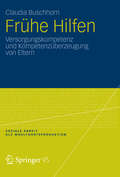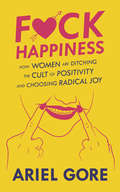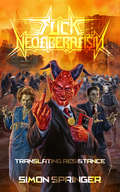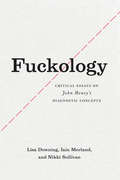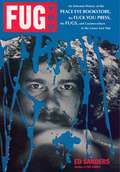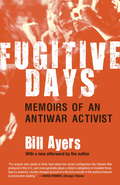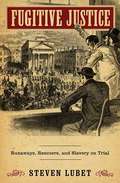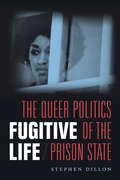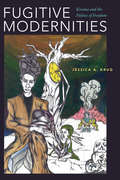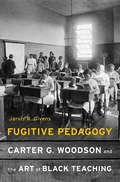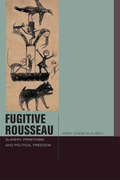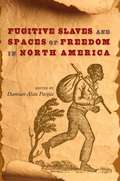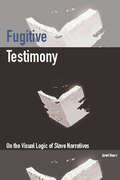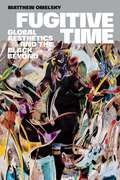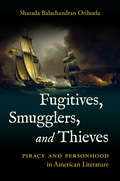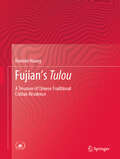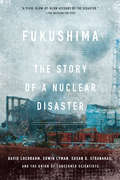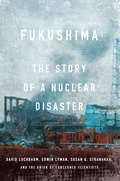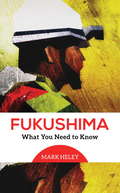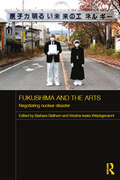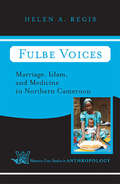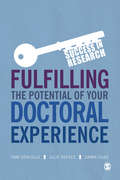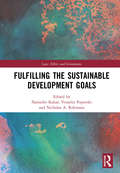- Table View
- List View
Frühe Hilfen
by Claudia BuschhornUntersuchungen zur Wirksamkeit der vielfältigen Angebote Früher Hilfen, verstanden als Bildungs-, Beratungs- und Unterstützungsangebote zur Förderung der elterlichen Beziehungs-, Erziehungs- und Versorgungskompetenz von (werdenden) Eltern, gibt es derzeit kaum. Claudia Buschhorn stellt eine angebotsübergreifende, wirkungsorientierte Analyse von Frühen Hilfen vor. Anhand einer telefonischen Befragung von AdressatInnen, die Frühe Hilfen besuchten, wurden Daten erhoben, die Aussagen darüber erlauben, inwiefern sich die Versorgungskompetenz sowie die elterliche Kompetenzüberzeugung verändern. Die Auswertungen zeigen positive Effekte der Angebote bei einer hohen subjektiven Zufriedenheit der AdressatInnen und liefern damit wichtige Impulse für die Diskussion um die Wirksamkeit Früher Hilfen.
Fuck Happiness: How Women Are Ditching the Cult of Positivity and Choosing Radical Joy
by Ariel GoreHappiness is big business. Books, consultants, psychologists, organizations, and even governments tout happiness secrets that are backed by scientific findings. The problem is that all of this science is done by and for cis white men. And some of the most vocal of these happiness experts were announcing that women could become happier by espousing "traditional" values and eschewing feminism. Skeptical of this hypothesis, Ariel Gore took a deep dive into the optimism industrial complex, reading the history, combing the research, attending the conferences, interviewing the thought leaders, and exploring her own and her friends' personal experiences and desires. Fuck Happiness is a nuanced, thoughtful examination of what happiness means and to whom, how it's played a role in defining modern gender roles and power structures, and how we can all have a more empowered relationship with the pursuit of joy in our lives.
Fuck Neoliberalism: Translating Resistance
by Simon SpringerThis book is a call to action against the most persistent and pestilent disease of our time. Translated into over twenty different languages, the book offers a call to action that transcends local contexts and speaks to the violent global conditions of our neoliberal age. Fuck Neoliberalism: Translating Resistance is a worldwide middle finger to the all-encompassing ideology of our era. The original essay sparked controversy in the academy when it was first released, and has since spread around the world as enthusiastic rebels translated it into their own languages. This book brings those translations together, accompanied with short essays from each translator that explain the reasons why they translated the text and describes the localized struggles against neoliberalism in their regions. With translations into languages from across the globe, including Mandarin, German, Indonesian, Spanish, Hindi, Italian, Korean, and many more, this book highlights the international nature of resistance to the totalitarian ideology of neoliberalism. Featuring a cover produced by renowned artist Ed Repka (a.k.a. the King of Thrash Metal Art), this internationalized, heavy-metal rant against the all-powerful ideology highlights a chink in its armor. When people across the world find a way to communicate a shared message and stand together, resistance can be both beautiful and inspiring.
Fuckology: Critical Essays on John Money's Diagnostic Concepts
by Lisa Downing Iain Morland Nikki SullivanOne of the twentieth century’s most controversial sexologists--or "fuckologists,” to use his own memorable term--John Money was considered a trailblazing scientist and sexual libertarian by some, but damned by others as a fraud and a pervert. Money invented the concept of gender in the 1950s, yet fought its uptake by feminists. He backed surgical treatments for transsexuality, but argued that gender roles were set by reproductive capacity. He shaped the treatment of intersex, advocating experimental sex changes for children with ambiguous genitalia. He pioneered drug therapy for sex offenders, yet took an ambivalent stance towards pedophilia. In his most publicized case study, Money oversaw the reassignment of David Reimer as female following a circumcision accident in infancy. Heralded by many as proof that gender is pliable, the case was later discredited when Reimer revealed that he had lived as a male since his early teens. In Fuckology, the authors contextualize and interrogate Money's writings and practices. The book focuses on his three key diagnostic concepts, "hermaphroditism,” "transsexualism,” and "paraphilia,” but also addresses his lesser-known work on topics ranging from animal behavior to the philosophy of science. The result is a comprehensive collection of new insights for researchers and students within cultural, historical, and gender studies, as well as for practitioners and activists in sexology, psychology, and patient rights.
Fug You: An Informal History of the Peace Eye Bookstore, the Fuck You Press, the Fugs, and Counterculture in the Lower East Side
by Ed SandersFug Youis Ed Sanders's unapologetic and often hilarious account of eight key years of "total assault on the culture," to quote his novelist friend William S. Burroughs. Fug Youtraces the flowering years of New York's downtown bohemia in the sixties, starting with the marketing problems presented by publishingFuck You / A Magazine of the Arts, as it faced the aboveground's scrutiny, and leading to Sanders's arrest after a raid on his Peace Eye Bookstore. The memoir also traces the career of the Fugs--formed in 1964 by Sanders and his neighbor, the legendary Tuli Kupferberg (called "the world's oldest living hippie" by Allen Ginsberg)--as Sanders strives to find a home for this famous postmodern, innovative anarcho-folk-rock band in the world of record labels.
Fugitive Days
by Bill AyersBill Ayers was born into privilege and is today a highly respected educator. In the late 1960s he was a young pacifist who helped to found one of the most radical political organizations in U.S. history, the Weather Underground. In a new era of antiwar activism and suppression of protest, his story, Fugitive Days, is more poignant and relevant than ever.From the Trade Paperback edition.
Fugitive Justice: Runaways, Rescuers, and Slavery On Trial
by Steven LubetDuring the tumultuous decade before the Civil War, no issue was more divisive than the pursuit and return of fugitive slaves—a practice enforced under the Fugitive Slave Act of 1850. When free Blacks and their abolitionist allies intervened, prosecutions and trials inevitably followed. These cases involved high legal, political, and—most of all—human drama, with runaways desperate for freedom, their defenders seeking recourse to a “higher law” and normally fair-minded judges (even some opposed to slavery) considering the disposition of human beings as property.
Fugitive Life: The Queer Politics of the Prison State
by Stephen DillonDuring the 1970s in the United States, hundreds of feminist, queer, and antiracist activists were imprisoned or became fugitives as they fought the changing contours of U.S. imperialism, global capitalism, and a repressive racial state. <P><P>In Fugitive Life Stephen Dillon examines these activists' communiqués, films, memoirs, prison writing, and poetry to highlight the centrality of gender and sexuality to a mode of racialized power called the neoliberal-carceral state. Drawing on writings by Angela Davis, the George Jackson Brigade, Assata Shakur, the Weather Underground, and others, Dillon shows how these activists were among the first to theorize and make visible the links between conservative "law and order" rhetoric, free market ideology, incarceration, sexism, and the continued legacies of slavery. <P>LDillon theorizes these prisoners and fugitives as queer figures who occupied a unique position from which to highlight how neoliberalism depended upon racialized mass incarceration. In so doing, he articulates a vision of fugitive freedom in which the work of these activists becomes foundational to undoing the reign of the neoliberal-carceral state.
Fugitive Modernities: Kisama and the Politics of Freedom
by Jessica A. KrugDuring the early seventeenth century, Kisama emerged in West Central Africa (present-day Angola) as communities and an identity for those fleeing expanding states and the violence of the trans-Atlantic slave trade. The fugitives mounted effective resistance to European colonialism despite—or because of—the absence of centralized authority or a common language. In Fugitive Modernities Jessica A. Krug offers a continent- and century-spanning narrative exploring Kisama's intellectual, political, and social histories. Those who became Kisama forged a transnational reputation for resistance, and by refusing to organize their society around warrior identities, they created viable social and political lives beyond the bounds of states and the ruthless market economy of slavery. Krug follows the idea of Kisama to the Americas, where fugitives in the New Kingdom of Grenada (present-day Colombia) and Brazil used it as a means of articulating politics in fugitive slave communities. By tracing the movement of African ideas, rather than African bodies, Krug models new methods for grappling with politics and the past, while showing how the history of Kisama and its legacy as a global symbol of resistance that has evaded state capture offers essential lessons for those working to build new and just societies.
Fugitive Pedagogy: Carter G. Woodson and the Art of Black Teaching
by Jarvis R. GivensA fresh portrayal of one of the architects of the African American intellectual tradition, whose faith in the subversive power of education will inspire teachers and learners today. Black education was a subversive act from its inception. African Americans pursued education through clandestine means, often in defiance of law and custom, even under threat of violence. They developed what Jarvis Givens calls a tradition of “fugitive pedagogy”—a theory and practice of Black education in America. The enslaved learned to read in spite of widespread prohibitions; newly emancipated people braved the dangers of integrating all-White schools and the hardships of building Black schools. Teachers developed covert instructional strategies, creative responses to the persistence of White opposition. From slavery through the Jim Crow era, Black people passed down this educational heritage. There is perhaps no better exemplar of this heritage than Carter G. Woodson—groundbreaking historian, founder of Black History Month, and legendary educator under Jim Crow. Givens shows that Woodson succeeded because of the world of Black teachers to which he belonged: Woodson’s first teachers were his formerly enslaved uncles; he himself taught for nearly thirty years; and he spent his life partnering with educators to transform the lives of Black students. Fugitive Pedagogy chronicles Woodson’s efforts to fight against the “mis-education of the Negro” by helping teachers and students to see themselves and their mission as set apart from an anti-Black world. Teachers, students, families, and communities worked together, using Woodson’s materials and methods as they fought for power in schools and continued the work of fugitive pedagogy. Forged in slavery, embodied by Woodson, this tradition of escape remains essential for teachers and students today.
Fugitive Rousseau: Slavery, Primitivism, and Political Freedom (Just Ideas)
by Jimmy Casas KlausenCritics have claimed that Jean-Jacques Rousseau was a primitivist uncritically preoccupied with “noble savages” and that he remained oblivious to the African slave trade. Fugitive Rousseau presents the emancipatory possibilities of Rousseau’s thought and argues that a fresh, “fugitive” perspective on political freedom is bound up with Rousseau’s treatments of primitivism and slavery.Rather than trace Rousseau’s arguments primarily to the social contract tradition of Hobbes and Locke, Fugitive Rousseau places Rousseau squarely in two imperial contexts: European empire in his contemporary Atlantic world and Roman imperial philosophy. Anyone who aims to understand the implications of Rousseau’s famous sentence “Man is born free, and everywhere he is in chains” or wants to know how Rousseauian arguments can support a radical democratic politics of diversity, discontinuity, and exodus will find Fugitive Rousseau indispensable.
Fugitive Slaves and Spaces of Freedom in North America (Southern Dissent)
by Damian Alan PargasThis volume introduces a new way to study the experiences of runaway slaves by defining different “spaces of freedom” they inhabited. It also provides a groundbreaking continental view of fugitive slave migration, moving beyond the usual regional or national approaches to explore locations in Canada, the U.S. North and South, Mexico, and the Caribbean. Using newspapers, advertisements, and new demographic data, contributors show how events like the Revolutionary War and westward expansion shaped the slave experience. Contributors investigate sites of formal freedom, where slavery was abolished and refugees were legally free, to determine the extent to which fugitive slaves experienced freedom in places like Canada while still being subject to racism. In sites of semiformal freedom, as in the northern United States, fugitives’ claims to freedom were precarious because state abolition laws conflicted with federal fugitive slave laws. Contributors show how local committees strategized to interfere with the work of slave catchers to protect refugees. Sites of informal freedom were created within the slaveholding South, where runaways who felt relocating to distant destinations was too risky formed maroon communities or attempted to blend in with free black populations. These individuals procured false documents or changed their names to avoid detection and pass as free. The essays discuss slaves’ motivations for choosing these destinations, the social networks that supported their plans, what it was like to settle in their new societies, and how slave flight impacted broader debates about slavery. This volume redraws the map of escape and emancipation during this period, emphasizing the importance of place in defining the meaning and extent of freedom. Contributors: Kyle Ainsworth | Mekala Audain | Gordon S. Barker | Sylviane A. Diouf | Roy E. Finkenbine | Graham Russell Gao Hodges | Jeffrey R. Kerr-Ritchie | Viola Franziska Müller | James David Nichols | Damian Alan Pargas | Matthew Pinsker A volume in the series Southern Dissent, edited by Stanley Harrold and Randall M. Miller
Fugitive Testimony: On the Visual Logic of Slave Narratives
by Janet NearyFugitive Testimony traces the long arc of the African American slave narrative from the eighteenth century to the present in order to rethink the epistemological limits of the form and to theorize the complicated interplay between the visual and the literary throughout its history. Gathering an archive of ante- and postbellum literary slave narratives as well as contemporary visual art, Janet Neary brings visual and performance theory to bear on the genre’s central problematic: that the ex-slave narrator must be both object and subject of his or her own testimony.Taking works by current-day visual artists, including Glenn Ligon, Kara Walker, and Ellen Driscoll, Neary employs their representational strategies to decode the visual work performed in nineteenth-century literary narratives by Elizabeth Keckley, Solomon Northup, William Craft, Henry Box Brown, and others. She focuses on the textual visuality of these narratives to illustrate how their authors use the logic of the slave narrative against itself as a way to undermine the epistemology of the genre and to offer a model of visuality as intersubjective recognition rather than objective division.
Fugitive Time: Global Aesthetics and the Black Beyond
by Matthew OmelskyIn Fugitive Time, Matthew Omelsky theorizes the embodied experience of time in twentieth- and twenty-first-century black artforms from across the world. Through the lens of time, he charts the sensations and coursing thoughts that accompany desires for freedom as they appear in the work of artists as varied as Toni Morrison, Yvonne Vera, Aimé Césaire, and Issa Samb. “Fugitive time” names a distinct utopian desire directed at the anticipated moment when the body and mind have been unburdened of the violence that has consumed black life globally for centuries, bringing with it a new form of being. Omelsky shows how fugitive time is not about attaining this transcendent release but is instead about sustaining the idea of it as an ecstatic social gathering. From the desire for ethereal queer worlds in the Black Audio Film Collective’s Twilight City to Sun Ra’s transformation of nineteenth-century scientific racism into an insurgent fugitive aesthetic, Omelsky shows how fugitive time evolves and how it remains a dominant form of imagining freedom in global black cultural expression.
Fugitives, Smugglers, and Thieves: Piracy and Personhood in American Literature
by Sharada Balachandran OrihuelaIn this book, Sharada Balachandran Orihuela examines property ownership and its connections to citizenship, race and slavery, and piracy as seen through the lens of eighteenth- and nineteenth-century American literature. Balachandran Orihuela defines piracy expansively, from the familiar concept of nautical pirates and robbery in international waters to postrevolutionary counterfeiting, transnational slave escape, and the illegal trade of cotton across the Americas during the Civil War. Weaving together close readings of American, Chicano, and African American literature with political theory, the author shows that piracy, when represented through literature, has imagined more inclusive and democratic communities than were then possible in reality. The author shows that these subjects are not taking part in unlawful acts only for economic gain. Rather, Balachandran Orihuela argues that piracy might, surprisingly, have served as a public good, representing a form of transnational belonging that transcends membership in any one nation-state while also functioning as a surrogate to citizenship through the ownership of property. These transnational and transactional forms of social and economic life allow for a better understanding of the foundational importance of property ownership and its role in the creation of citizenship.
Fujian's Tulou: A Treasure of Chinese Traditional Civilian Residence
by Hanmin HuangThis book analyzes a large number of typical tulou buildings and compact communities in detail, and painstakingly studies the way of life practiced in these communities, their defense systems, building techniques, spatial features, antithetical couplets culture, and historical origins. As such, it offers readers access to a unique treasure of traditional civilian residence, while also representing a valuable asset for architects and researchers in architectural history, cultural relics and fine arts.
Fukushima
by The Union of Concerned Scientists David Lochbaum Edwin Lyman Susan Q. Stranahan"A gripping, suspenseful page-turner" (Kirkus Reviews) with a "fast-paced, detailed narrative that moves like a thriller" (International Business Times), Fukushima teams two leading experts from the Union of Concerned Scientists, David Lochbaum and Edwin Lyman, with award-winning journalist Susan Q. Stranahan to give us the first definitive account of the 2011 disaster that led to the worst nuclear catastrophe since Chernobyl.Four years have passed since the day the world watched in horror as an earthquake large enough to shift the Earth's axis by several inches sent a massive tsunami toward the Japanese coast and Fukushima Daiichi nuclear power plant, causing the reactors' safety systems to fail and explosions to reduce concrete and steel buildings to rubble. Even as the consequences of the 2011 disaster continue to exact their terrible price on the people of Japan and on the world, Fukushima addresses the grim questions at the heart of the nuclear debate: could a similar catastrophe happen again, and--most important of all--how can such a crisis be averted?
Fukushima
by The Union of Concerned Scientists David Lochbaum Edwin Lyman Susan Q. StranahanOn March 11, 2011, an earthquake large enough to knock the earth from its axis sent a massive tsunami speeding toward the Japanese coast and the aging and vulnerable Fukushima Daiichi nuclear power reactors. Over the following weeks, the world watched in horror as a natural disaster became a man-made catastrophe: fail-safes failed, cooling systems shut down, nuclear rods melted. In the first definitive account of the Fukushima disaster, two leading experts from the Union of Concerned Scientists, David Lochbaum and Edwin Lyman, team up with journalist Susan Q. Stranahan, the lead reporter of the Philadelphia Inquirer's Pulitzer Prize-winning coverage of the Three Mile Island accident, to tell this harrowing story. Fukushima combines a fast-paced, riveting account of the tsunami and the nuclear emergency it created with an explanation of the science and technology behind the meltdown as it unfolded in real time. Bolstered by photographs, explanatory diagrams, and a comprehensive glossary, the narrative also extends to other severe nuclear accidents to address both the terrifying question of whether it could happen elsewhere and how such a crisis can be averted in the future.
Fukushima
by Mark HeleyFukushima: What You Need to Know is a concise but comprehensive guide to the disaster at Fukushima and its ongoing consequences. Presenting a solution-based approach, Mark Heley details the current problems and future potential risks and offers balanced information about what we can do about them. The book covers: * The extent of the pollution from Fukushima and what and where the dangers are * The real risks from radiological pollution and the protective measures you can take * Possible solutions for stopping the ongoing contamination and cleaning up the damage already done * A call for meaningful international collaboration and the ending of the era of secrecy and cover-ups about the risks of nuclear power
Fukushima and the Arts: Negotiating Nuclear Disaster (Routledge Contemporary Japan Series)
by Barbara Geilhorn Kristina Iwata-WeickgenanntThe natural and man-made cataclysmic events of the 11 March 2011 disaster, or 3.11, have dramatically altered the status quo of contemporary Japanese society. While much has been written about the social, political, economic, and technical aspects of the disaster, this volume represents one of the first in-depth explorations of the cultural responses to the devastating tsunami, and in particular the ongoing nuclear disaster of Fukushima. This book explores a wide range of cultural responses to the Fukushima nuclear calamity by analyzing examples from literature, poetry, manga, theatre, art photography, documentary and fiction film, and popular music. Individual chapters examine the changing positionality of post-3.11 northeastern Japan and the fear-driven conflation of time and space in near-but-far urban centers; explore the political subversion and nostalgia surrounding the Fukushima disaster; expose the ambiguous effects of highly gendered representations of fear of nuclear threat; analyze the musical and poetic responses to disaster; and explore the political potentialities of theatrical performances. By scrutinizing various media narratives and taking into account national and local perspectives, the book sheds light on cultural texts of power, politics, and space. Providing an insight into the post-disaster Zeitgeist as expressed through a variety of media genres, this book will be of interest to students and scholars of Japanese Studies, Japanese Culture, Popular Culture, and Literature Studies.
Fulbe Voices
by Helen A. RegisFulbe Voices is based on everyday conversations in the West African village of Domaayo, Cameroon, where men and women struggle with the multiple cultural contradictions and social tensions emerging from their varied perspectives as farmers and entrepreneurs, schoolboys and elders, married and free women, rulers and ruled, Muslim scholars and spirit workers. Though sharing many terms of debate, Fulbe persons passionately argue about Muslim ideals and "pagan” practices, about Fulbe tradition and national reform, and about local histories and global flows. In Fulbe culture, social worlds are articulated and transformed through narrative and embodied performance.
Fulbe Voices
by Helen A. RegisFulbe Voices is based on everyday conversations in the West African village of Domaayo, Cameroon, where men and women struggle with the multiple cultural contradictions and social tensions emerging from their varied perspectives as farmers and entrepreneurs, schoolboys and elders, married and free women, rulers and ruled, Muslim scholars and spirit workers. Though sharing many terms of debate, Fulbe persons passionately argue about Muslim ideals and "pagan" practices, about Fulbe tradition and national reform, and about local histories and global flows. In Fulbe culture, social worlds are articulated and transformed through narrative and embodied performance.
Fulfilling the Potential of Your Doctoral Experience (Success in Research)
by Professor Pam Denicolo Julie Reeves Dawn DukeDo you want to thrive in your doctoral research? Do you want to do more than just survive? If so this is the book for you. Focused on empowering the doctoral researcher, it is packed with advice on how to make the best of opportunities and enjoy your research experience while dealing with challenges. Whether you need to find sources of constructive feedback, are facing an unexpected disturbance to your project, or have ambitions beyond your academic goals, this book provides practical, flexible tips for conducting effective research and engaging with the complex world of academia, including how to: Maintain momentum through each stage of the research process Make the most of available resources, training, and support Explore new technologies, networks, and dissemination strategies Maximize the value of assessment Use this project as a springboard into further research and career opportunities Acknowledging that every doctoral experience is unique, this book goes beyond a script for success and instead offers a full studio of flexible, creative tools and adaptable action points that equip you to compose your own distinctive story of research success. About the series The Success in Research series, from Cindy Becker and Pam Denicolo, provides short, authoritative and accessible guides on key areas of professional and research development. Avoiding jargon and cutting to the chase of what you really need to know, these practical and supportive books cover a range of areas from presenting research to achieving impact, and from publishing journal articles to developing proposals. They are essential reading for any student or researcher interested in developing their skills and broadening their professional and methodological knowledge in an academic context.
Fulfilling the Potential of Your Doctoral Experience (Success in Research)
by Professor Pam Denicolo Julie Reeves Dawn DukeDo you want to thrive in your doctoral research? Do you want to do more than just survive? If so this is the book for you. Focused on empowering the doctoral researcher, it is packed with advice on how to make the best of opportunities and enjoy your research experience while dealing with challenges. Whether you need to find sources of constructive feedback, are facing an unexpected disturbance to your project, or have ambitions beyond your academic goals, this book provides practical, flexible tips for conducting effective research and engaging with the complex world of academia, including how to: Maintain momentum through each stage of the research process Make the most of available resources, training, and support Explore new technologies, networks, and dissemination strategies Maximize the value of assessment Use this project as a springboard into further research and career opportunities Acknowledging that every doctoral experience is unique, this book goes beyond a script for success and instead offers a full studio of flexible, creative tools and adaptable action points that equip you to compose your own distinctive story of research success. About the series The Success in Research series, from Cindy Becker and Pam Denicolo, provides short, authoritative and accessible guides on key areas of professional and research development. Avoiding jargon and cutting to the chase of what you really need to know, these practical and supportive books cover a range of areas from presenting research to achieving impact, and from publishing journal articles to developing proposals. They are essential reading for any student or researcher interested in developing their skills and broadening their professional and methodological knowledge in an academic context.
Fulfilling the Sustainable Development Goals: On a Quest for a Sustainable World (Law, Ethics and Governance)
by Narinder Kakar, Vesselin Popovski and Nicolas A. RobinsonThis book contains assessment of the progress, or the lack of it, in implementing the UN Sustainable Development Goals (SDGs). Through review of the assessments and of case studies, readers can draw lessons from the actions that could work to positively address the goals. The 2030 Agenda for Sustainable Development is designed to catalyze action in critical areas of importance to humanity and the planet. The effort to implement the SDGs, however, demands a sense of urgency in the face of environmental degradation, climate change, emerging conflicts, and growing inequality, among a number of other socio-economic problems. Five years after the launch of the 2030 Agenda, this book takes stock of how far the world has come and how we can position ourselves to achieve the global targets. The book is one of the first to assess how the implementation is impeded by the onset of COVID-19. It contains a special chapter on COVID-19 and the SDGs, while many thematic chapters on different SDGs also assess how COVID-19 adversely affects implementation, and what measures could be taken to minimize the adverse effects. This publication thus provides a fresh look at implementation of the SDGs highlighting impactful and creative actions that go beyond the business-as-usual development efforts. The volume reinforces this analysis with expert recommendations on how to support implementation efforts and achieve the SDGs through international and national strategies and the involvement of both the public and private sectors. The result is an indispensable textual tool for policy makers, academia, intergovernmental organizations (IGOs) and non-governmental organizations (NGOs), as well as the public, as we march toward the 2030 deadline.
